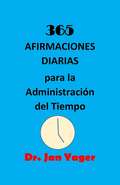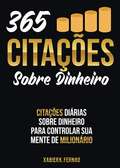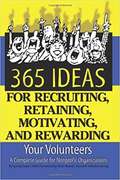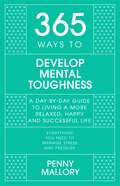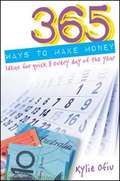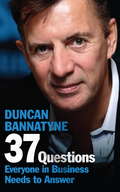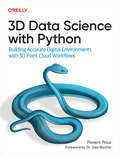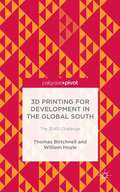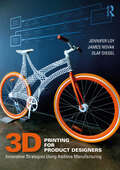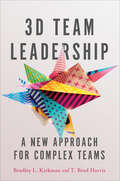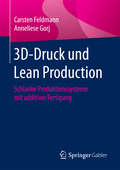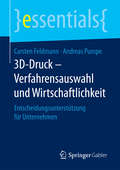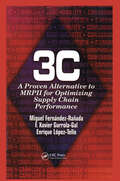- Table View
- List View
365 AFIRMACIONES DIARIAS para la Administración del Tiempo
by Jan YagerUna colección de afirmaciones sobre la administración del tiempo por la experta en productividad, coach, oradora y socióloga Dra. Jan Yager, y citas famosas seleccionadas sobre el tiempo; el libro también incluye actividades útiles para mejorar la eficiencia en el trabajo y en el tiempo de disfrute. Se ofrece una introducción sobre la administración del tiempo, un ensayo sobre las tres lecciones de administración del tiempo que el padre de la autora le enseñó, y una bibliografía.
365 Citações Sobre Dinheiro: Citações Diárias Sobre Dinheiro Para Controlar Sua Mente de Milionário
by Xabier K. FernaoSe não nascemos ricos, primeiro temos o pensamento de rico ou nos tornamos ricos antes do pensamento? Você sabe a resposta. O pensamento precede tudo. Antecede mais dinheiro, mais felicidade, mais sucesso, mais saúde e mais riqueza. Nestas 365 Citações Sobre Dinheiro, você será apresentado às melhores 365 citações sobre dinheiro de pessoas que alcançaram montantes exorbitantes de riqueza e dinheiro. Não. Estas citações não o farão rico do dia para a noite. Não são um esquema para ficar rico facilmente. Não são aqueles 5 passos para fazer seu primeiro milhão. Se isto não te interessa, pare de ler. No entanto, o que estas 365 Citações farão por você isto... Elas o prepararão para as riquezas. Serão sua base para quando oportunidades grandes aparecerem para você, esteja pronto para agarrá-las sem hesitação.
365 Ideas For Recruiting, Retaining, Motivating And Rewarding Your Volunteers: A Complete Guide For Nonprofit Organizations
by Sunny Fader Brian BandtAccording to recent statistics by the U.S. Department of Labor, 26.7 percent of the population volunteers. Unfortunately, while the population is increasing, the percentage of Americans who volunteer is decreasing each year. What this means is that you must hang onto and keep your volunteers happy and coming back, perhaps bringing new volunteer recruits with them. This new book is packed with hundreds of simple and inexpensive ways to motivate, challenge, and reward your volunteers. Volunteers today need constant reinforcement and recognition, and here is how to do it. With real life, proven examples and case studies from actual nonprofit organizations, you can use this book daily to boost morale and productivity and find fundraising activities. This is your opportunity to build an organization that people love to volunteer, and you can do so by using these quick, effective, humorous, innovative, and simply fun solutions. Make your organization a happy place to volunteer, and reap the benefits. Atlantic Publishing is a small, independent publishing company based in Ocala, Florida. Founded over twenty years ago in the company president’s garage, Atlantic Publishing has grown to become a renowned resource for non-fiction books. Today, over 450 titles are in print covering subjects such as small business, healthy living, management, finance, careers, and real estate. Atlantic Publishing prides itself on producing award winning, high-quality manuals that give readers up-to-date, pertinent information, real-world examples, and case studies with expert advice. Every book has resources, contact information, and web sites of the products or companies discussed.
365 Ways to Develop Mental Toughness: A Day-by-day Guide to Living a Happier and More Successful Life
by Penny Mallory365 Ways to Develop Mental Toughness is a day-by-day guide to building the confidence and resilience you need to get in control of your life, reach your goals and come out on top.Successful people are mentally tough. And you have to be, because achieving success isn't easy. No one can avoid the minefield of setbacks, crisis, tragedy and challenge that is part of being alive. Life throws obstacles in your path daily, but mentally tough people can manage the stress and pressure. They see challenges as opportunities. They persist no matter what. They pick themselves up and go again. They are confident, humble, in control and 100% committed to what they set out to achieve. That may sound as if mentally tough people are special, but they're not. No one is born with mental toughness - you have to develop it by deliberately working on your resilience, determination, emotional control and focus. Here you'll find a new idea every day to help you do it. Practice them regularly and see the difference it makes. Keep applying them and you will be developing your mental toughness every single day.365 Ways to Develop Mental Toughness focuses on the small stuff you can do every day to make life better. Because when you get the little things right, the big things follow. And today is the very best day to start making those positive changes!
365 Ways to Develop Mental Toughness: A Day-by-day Guide to Living a Happier and More Successful Life
by Penny Mallory365 Ways to Develop Mental Toughness is a day-by-day guide to building the confidence and resilience you need to get in control of your life, reach your goals and come out on top.Successful people are mentally tough. And you have to be, because achieving success isn't easy. No one can avoid the minefield of setbacks, crisis, tragedy and challenge that is part of being alive. Life throws obstacles in your path daily, but mentally tough people can manage the stress and pressure. They see challenges as opportunities. They persist no matter what. They pick themselves up and go again. They are confident, humble, in control and 100% committed to what they set out to achieve. That may sound as if mentally tough people are special, but they're not. No one is born with mental toughness - you have to develop it by deliberately working on your resilience, determination, emotional control and focus. Here you'll find a new idea every day to help you do it. Practice them regularly and see the difference it makes. Keep applying them and you will be developing your mental toughness every single day.365 Ways to Develop Mental Toughness focuses on the small stuff you can do every day to make life better. Because when you get the little things right, the big things follow. And today is the very best day to start making those positive changes!
365 Ways to Live Cheap
by Trent HammUse cold water for most clothes washing and save up to $63 a year. Minimize your carload and reduce your gas mileage by as much as 5 percent. Invest in a deep freezer and fill it up with meat discounted at 30 percent or more.Take a look at your life and you'll realize that there's almost always a way to make do on less. This book offers up a bevy of ways to cut down on costs and still enjoy a satisfying lifestyle in any situation. From practicing good gas conservation habits to learning to love leftovers, this book will help every aspiring penny pincher stop the unnecessary spending and find the fun in frugality!
365 Ways to Live Cheap: Your Everyday Guide to Saving Money
by Trent Hamm<p>Use cold water for most clothes washing and save up to $63 a year. Minimize your carload and reduce your gas mileage by as much as 5 percent. Invest in a deep freezer and fill it up with meat discounted at 30 percent or more. <p>Take a look at your life and you'll realize that there's almost always a way to make do on less. This book offers up a bevy of ways to cut down on costs and still enjoy a satisfying lifestyle in any situation. From practicing good gas conservation habits to learning to love leftovers, this book will help every aspiring penny pincher stop the unnecessary spending and find the fun in frugality!</p>
365 Ways to Make Money
by Kylie OfiuThe how-to guide to making real money with little or no start-up costsWe'd all like to find out how to make money. 365 Ways to Make Money proves that you don't have to be a slick entrepreneur or become embroiled in get-rich-quick schemes to boost your cash flow. In fact, this guide shows that anyone can make money--up to thousands of dollars--with little or no start-up costs. This guide shows there are ways to make money, whether you are a stay-at-home parent, a student or a professional looking for extra income, or a hobbyist looking to convert your interest into cash.365 Ways to Make Money is the ultimate inspirational, yet practical, guide to finding ways to earn extra income. With one tried-and-true idea for every day of the year, it looks at ways you can instantly put your ideas in to practice, providing money-making ideas from every area of your life--from your home and cars to your knowledge and interests.More than just a list of ideas, this is a real how-to guide, with tried and tested strategies.Unlike other moneymaking titles, this book also gives you the financial knowledge you need to support your moneymaking journey.
365 Ways to Save the Planet: A Day-by-day Guide to Living Sustainably (365 Series)
by Nergiz De BaereARE YOU READY TO CHANGE THE WORLD?365 WAYS TO SAVE THE PLANET is a full year's worth of daily wisdom, carefully selected to inspire you to take the urgent action our very existence desperately needs. You'll find actions and challenges, surprising facts about the climate crisis, templates for writing to political representatives, scientific explanations of important concepts, popular misconceptions about sustainability, and much more. 365 WAYS TO SAVE THE PLANET goes way beyond predictable sustainability advice about how to recycle. Here you'll discover the small stuff you can do every day to change the world. Because when you get the little things right, the big things follow.
365 Ways to Save the Planet: A Day-by-day Guide to Living Sustainably (365 Series)
by Nergiz De BaereARE YOU READY TO CHANGE THE WORLD?365 WAYS TO SAVE THE PLANET is a full year's worth of daily wisdom, carefully selected to inspire you to take the urgent action our very existence desperately needs. You'll find actions and challenges, surprising facts about the climate crisis, templates for writing to political representatives, scientific explanations of important concepts, popular misconceptions about sustainability, and much more. 365 WAYS TO SAVE THE PLANET goes way beyond predictable sustainability advice about how to recycle. Here you'll discover the small stuff you can do every day to change the world. Because when you get the little things right, the big things follow.
37 Questions Everyone in Business Needs to Answer
by Duncan BannatyneThe UK's number 1 business expert is back with another dose of razor-sharp advice and insight. With Duncan's help you will be able to cut to the chase of the most important business issues, and have brilliant answers ready at your fingertips.
37 Questions Everyone in Business Needs to Answer
by Duncan BannatyneBestselling business author and star of BBC TV's Dragons' Den, Duncan Bannatyne is back with a brand new book. 37 Questions covers all the essential queries business managers and entrepreneurs should be able to ask themselves and answer honestly, but so often fail to do so, such as: What's my most profitable line?What do my customers want next?Who's my greatest business rival?What might stand in my way?
3D Data Science with Python: Building Accurate Digital Environments with 3D Point Cloud Workflows
by Florent PouxOur physical world is grounded in three dimensions. To create technology that can reason about and interact with it, our data must be 3D too. This practical guide offers data scientists, engineers, and researchers a hands-on approach to working with 3D data using Python. From 3D reconstruction to 3D deep learning techniques, you'll learn how to extract valuable insights from massive datasets, including point clouds, voxels, 3D CAD models, meshes, images, and more.Dr. Florent Poux helps you leverage the potential of cutting-edge algorithms and spatial AI models to develop production-ready systems with a focus on automation. You'll get the 3D data science knowledge and code to:Understand core concepts and representations of 3D dataLoad, manipulate, analyze, and visualize 3D data using powerful Python librariesApply advanced AI algorithms for 3D pattern recognition (supervised and unsupervised)Use 3D reconstruction techniques to generate 3D datasetsImplement automated 3D modeling and generative AI workflowsExplore practical applications in areas like computer vision/graphics, geospatial intelligence, scientific computing, robotics, and autonomous drivingBuild accurate digital environments that spatial AI solutions can leverageFlorent Poux is an esteemed authority in the field of 3D data science who teaches and conducts research for top European universities. He's also head professor at the 3D Geodata Academy and innovation director for French Tech 120 companies.
3D Printing for Construction with Alternative Materials (Digital Innovations in Architecture, Engineering and Construction)
by Ana Sofia Guimarães Bárbara Rangel Jorge Lino Leonardo SantanaThis book explores the latest achievements and design possibilities that 3D printing for construction (DPC) can offer, the alternative materials to natural aggregates or cement and even the 4th dimension that is already starting in this area. DPC materiality is starting to be explored in architecture as a new design language to reach not only outrageous forms but also to leverage the building process and its performance. Like Corbusier explored the concrete potentiality of concrete to release the façade and the plan, 3DPC is allowing to straighten design freedom with building performance. Industry and Scientific research are offering design professionals possibilities to start a new design movement. New paths are also starting to be tracked to reduce even more this building system footprint, stalking alternatives to Portland cement (PC). Today is already possible to build with the soil from the buildings’ ground. Leftovers from various industries are opening possibilities to decrease the PC and natural aggregates rate in printable mortars. From the industry, salt is becoming a possibility to be used in 3DPC. Sugar can ashes are improving the mortar performance reducing adjuvants. Construction and demolition waste can substitute natural aggregates and even offer new textures and color possibilities. Finally, to close this edition, the latest steps on the use of Phase Change Materials in additive manufacturing are collected to raise awareness to the next step of AM, the 4D printing.
3D Printing for Development in the Global South: The 3D4D Challenge
by Thomas Birtchnell William HoyleWill 3D printers become as commonplace as mobile phones in the megacities or the backwaters of the Global South? Thomas Birtchnell and William Hoyle assess the development potential of this new technique for producing three-dimensional objects, which resembles the way a paper printer produces pages of text. Will 3D printing for development become a key strategy for community action against enduring material poverty? Birtchnell and Hoyle consider this question through a centrepiece case study on the UK charity techfortrade's 3D4D Challenge.
3D Printing for Product Designers: Innovative Strategies Using Additive Manufacturing
by Olaf Diegel Jennifer Loy James Novak3D Printing for Product Designers closes the gap between the rhetoric of 3D printing in manufacturing and the reality for product designers. It provides practical strategies to support the adoption and integration of 3D printing into professional practice. 3D printing has evolved over the last decade into a practical proposition for manufacturing, opening up innovative opportunities for product designers. From its foundations in rapid prototyping, additive manufacturing has developed into a range of technologies suitable for end-use products. This book shows you how to evaluate and sensitively understand people, process, and products and demonstrates how solutions for working with additive manufacturing can be developed in context. It includes a practical, step-by-step plan for product designers and CEOs aimed at supporting the successful implementation of 3D printing by stakeholders at all levels of a manufacturing facility, tailored to their stage of technology integration and business readiness. It features a wide range of real-world examples of practice illustrated in full colour, across industries such as healthcare, construction, and film, aligning with the strategic approach outlined in the book. The book can be followed chronologically to guide you to transform your process for a company, to meet the unique needs of a specific client, or to be used as a starting point for the product design entrepreneur. Written by experienced industry professionals and academics, this is a fundamental reference for product designers, industrial designers, design engineers, CEOs, consultants, and makers.
3D Systems
by David Lane Karim R. LakhaniIn late 2013, Rajeev Kulkarni needed to decide how best to facilitate the emergence of a broad base of users and content to promote the sale of 3D Systems's consumer-focused 3D printers. As yet, neither the company nor users had identified an indispensable application for 3D printing for consumers, despite a plethora of potential opportunities.
3D Team Leadership: A New Approach for Complex Teams
by Bradley L. Kirkman T. Brad HarrisMany organizations believe that high-functioning teams hold the key to breakthrough thinking, superior customer service, and high-quality products. But, all too often, leaders and managers fail to support teams so that they can deliver on their promises. For instance, many leaders ask for teamwork, but only reward and evaluate individual performance; focus on the group at the expense of individual members; or leave team members to sort out their differences, leading to the formation of unhealthy cliques. In 3D Team Leadership, Bradley L. Kirkman and T. Brad Harris present a dynamic new model for maximizing team performance. Previous books have treated teams as groups of people working interdependently, an approach that overlooks two crucial components: the individuals who make up the team and the subgroups that form within and between teams. To create a fuller portrait of team behavior, Kirkman and Harris propose an innovative "3D" framework that takes into account all three factors. Drawing on their own research, best-in-class studies, and extensive consulting, they show leaders how to properly diagnose the state of their teams, hone in on the element that needs attention, and seamlessly shift focus among the three components of teamwork as time goes on. Delivering practical guidance rooted in scholarship, 3D Team Leadership is a thoughtful and straightforward guide for the complex challenge of teaming today.
3D-Druck und Lean Production: Schlanke Produktionssysteme mit additiver Fertigung
by Carsten Feldmann Anneliese GorjDie Prinzipien und Methoden der Lean Production haben aus wissenschaftlicher Perspektive einen hohen Reifegrad erreicht, ihr Durchdringungsgrad in der Unternehmenspraxis steigt stetig. Die additiven Fertigungsverfahren des 3D-Drucks entwickeln sich sehr dynamisch im Hinblick auf neue Verfahren, Materialien und Anwendungsbereiche. Praktikern, Wissenschaftlern und Studierenden beantwortet dieses Buch umfassend die Frage, inwieweit 3D-Druck die Prinzipien und Methoden der Lean Production unterst#65533;tzt und als Fertigungsverfahren in ein schlankes Produktionssystem zu integrieren ist. Dazu wird Lean Production kompakt erl#65533;utert und Basiswissen zur additiven Fertigung mittels 3D-Druckmaschinen vermittelt.
3D-Druck – Verfahrensauswahl und Wirtschaftlichkeit: Entscheidungsunterstützung für Unternehmen (essentials)
by Carsten Feldmann Andreas PumpeDie Autoren unterst#65533;tzen Praktiker bei der Investitionsentscheidung zum Einsatz des 3D-Drucks, indem sie die Wirkungen auf Beschaffungs-, Produktions-, Distributions- und Retourenprozesse aufzeigen. Ihr pragmatisches Vorgehensmodell unterst#65533;tzt die Auswahl des Druckverfahrens und die Analyse der Wirtschaftlichkeit. Sie entwickelten es in Zusammenarbeit mit acht Unternehmen der Automobil-, Elektronik-, Lebensmittel- und Kunststoffindustrie. Dabei werden die Wirkungen auf die Supply Chain ganzheitlich betrachtet, um einen Vergleich zu konkurrierenden Szenarien wie konventionelle Fertigungsverfahren oder externe Beschaffung zu erm#65533;glichen.
3G Capital
by Jo Tango Alys FerragamoIn June 2022, 3G Capital Co-Managing Partners Alex Behring and Daniel Schwartz were in a partners' meeting. On the agenda were three potential investments. Code named "Alpha," "Beta," and "Charlie," they were the finalists amongst hundreds that the team had screened. Unlike other private equity firms, 3G did not build a portfolio: each of its funds had only one investment. This model had worked extremely well for some investments, with successes like Restaurant Brands International, but it had also faced some challenges. Each investment decision was crucial to the future of the firm. What should their next investment be?
3M Optical Systems: Managing Corporate Entrepreneurship
by Christopher A. Bartlett Afroze MohammedA middle-level division manager must decide whether he should support an investment request for a third attempt at launching a new product developed by a struggling business unit. Describes the long, difficult process by which the unit has developed the product--a computer privacy screen--after years of problems and continuing losses, and its absolute faith in the project. Also presents the division manager's concerns about the need for discipline and control, setting up a tension that is focused on the launch decision.
3M: Profile of an Innovating Company
by Christopher A. Bartlett Afroze MohammedTraces the birth and development of 3M Corp., focusing in particular on the origins of its entrepreneurially-based ability to innovate. In particular, it highlights the role of CEO William L. McKnight in creating a unique set of values, policies, and structures to nurture and develop continuous renewal. With the changing environment of the 1980s, however, a new generation of CEOs begin to adopt new policies and change the cultural norms that helped 3M grow. The trigger issue focuses on what other changes are required.
3c: A Proven Alternative to MRPII for Optimizing Supply Chain Performance
by F Xavier Gurrola-Gal Miguel Fernandez-Ranada Enrique Lopez-TelloLack of materials or goods to satisfy customer orders under current market conditions represents an extremely costly and important problem facing businesses today. This is a problem that companies have spent hundreds of millions of dollars trying to solve. This book introduces a new theory, 3C, which will solve these problems. The authors, experts from Lucent Technologies, discuss in detail the relationship between the 3Cs - capacity, commonality, and consumption - and how this relationship can revolutionize your business. You will learn how to: reduce overhead expense and improve shipping performance by using the business capacity as the basis for materials planning; reduce investments in inventory by using the commonality of components; obtain dramatic improvements in the lead time of customer orders by using the actual consumption of materials instead of inaccurate sales forecasts as the basis for purchasing. The new and exciting techniques based on 3C generate immediate business benefits, for example: executing the purchasing function with a new criteria and formulae that can eliminate material shortages and significantly improve shipping performance, sales volumes, operating expense and company image.3C-A Proven Alternative to MRPII for Optimizing Supply Chain Performance gives you the knowledge and practical guidelines to better manage end-to-end Supply Chains and eliminate the expensive and annoying problem of material shortages that most businesses suffer.Features
3i Group plc
by Josh Lerner G. Felda Hardymon Ann LeamonBrian Larcombe, CEO of 3i Group, one of the world's largest private equity firms and one of the few publicly listed ones, is deciding how best to use his firm's international network to deliver superior returns to shareholders. This case presents 3i's history and international strategy.
